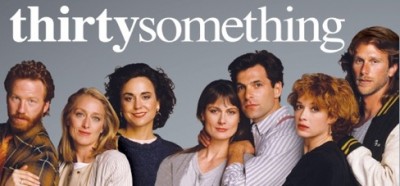
In 1987, ABC launched an hour-long drama called thirtysomething that featured baby-boomers settling down, raising kids, being a part of the establishment, etc. You know, from fighting “the man” to becoming “the man.” Part of the storyline was two male friends, Michael and Elliot, working in advertising and sometimes having to deal with their values conflicting with capitalism. In this episode, the guys, who had their own small agency that went under, are hired by a large agency with a boss {Miles Drentel} who has a penchant for not-so-subtle digs. This is a long clip, the first 10 minutes of a 1989 episode, “New Job,” airdate:: 11 April. The whole episode is on this YouTube channel.
Fast forward twenty years and AMC launches Mad Men in 2007. Unlike thirtysometing’s focus on current issues of values and ideals, Mad Men projects today’s issues in an older period. The result is a well-polished show that uses the Cold War 1960s that predates the Civil Rights movement, the rise of feminism, and the call for gay rights. Viewers get to gaze into the workplace with Foucauldian precision, where the official art of capitalism is created like so much sausage in a meat packing plant, in a workplace full of sex, alcohol, and cigarettes, not to mention the occasional firearm.
I take issues with some of the writing on the show, but that’s neither here nor there. I will say there’s a certain cool detachment that the characters have, as they feed upon opportunism in the workplace, while creating cultural products {ads} that do the same. On the show, Pete Campbell is a smarmy manor born WASP full of churlishness, ambition, and guile. We aren’t supposed to like Pete, but it is Pete with his ambition fueling his desire to make a buck for his client who is willing to break the demographic colour barrier, as if he’s the Branch Rickey of advertising.
Here’s Pete, Paul Kinsey , and Harry Crane going over data and finding that urban blacks are buying Admiral TVs::
In the elevator, he does a bit of “qualitative research” by asking Hollis about his brand preferences::
Here’s Pete’s pitch to Admiral, complete with a framework for an “ethnic marketing” strategy::
The client is put off by this, reluctant to engage a strategy that would create black brand associations. Pete is called on the carpet and Roger Sterling even goes as far to call him Martin Luther King {Jr.}. This is a few episodes after Sterling donned blackface and sang “My Old Kentucky Home” at a Kentucky Derby party he was hosting::
So, Pete being the übercapitalist is lambasted for not understanding the realities of the economics of branding in the early 1960s. The implication being “white flight” from the brand.
It is Lane Pryce, a British expatriate in New York, who is the only one besides Pete to see value in “ethnic marketing” strategies. Pete serves as a metaphor for blind capitalism that serves to take everyone’s money equally. An idealized capitalism of individuals acting like atomistic agents in the market. The interesting this is that Pete could have also been in the US music industry in the 1990s, seeing a way to market the unmarketable, hard-edged rap and hip-hop by black artists to mainstream audiences.
So, Pete the weasel turns out to be both the hero of capitalism and racial “equity.”
Twitterversion:: newblogpost:: Clips of #MadMen showing #PeteCampbell’s #ethnicmarketing pitch for a TV brand in 1963. #ThickCulture http://url.ie/2gwu @Prof_K

Comments